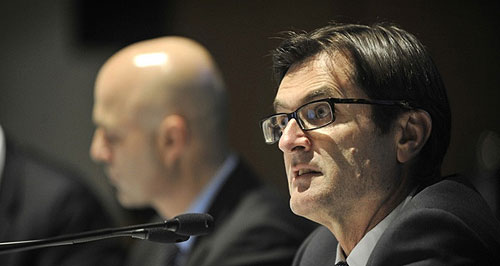Make / Model Search
News - General NewsMinister promises fair free tradeFair go: Federal industry minister Greg Combet tried to alleviate fears within the local automotive manufacturing industry about future Free Trade Ageements with Asian countries. Combet tells car industry not to worry about FTAs, despite “unfortunate” Thai deal13 Aug 2012 By IAN PORTER FEDERAL industry minister Greg Combet has tried to reassure the domestic car and parts industries that Australia will not be tricked or taken down when it signs new free trade agreements with Asian countries. He said the fear within the local industry that Australia’s trade negotiators did not place enough value on the domestic car industry and were willing to grant greater automotive concessions than they received were “a big generalisation”. However, he also warned the industry that the government was not going to take any action to shield the Australian manufacturing sector, which employs almost 1 million people, from the ravages of the strong Australian dollar, indicating that the government was not going to take action over the string of factory closures that have been eroding the country’s manufacturing capacity. Speaking exclusively to GoAuto, Mr Combet said he had raised the plight of the Australian car industry and manufacturing generally with the trade minister, Craig Emerson. Mr Combet said he was well aware of the “unfortunate” experience with the Thailand Free Trade Agreement. The agreement reduced tariffs on Thai products coming to Australia to zero immediately and gave Thailand some years to reduce its tariffs on Australian vehicles. No sooner had the deal been signed than Thailand slapped a massive excise duty – not a tariff – on vehicles of three litres or more. Thailand now sends more than 100,000 vehicles a year to Australia and we do not export a single vehicle back to Thailand. A speech on Friday to the Federation of Automotive Products Manufacturers (FAPM) national conference by the deputy secretary general of the Thailand Board of Trade, Ms Duangjai Asawachintachit, did little to ease the pain. “Not many people in Australia realise that we had excise laws in place before the Free Trade Agreement was signed,” she said. “We just adjusted the rates.” Mr Combet said that input on FTAs from the parts industry had helped in recent months. “I have just found, as the government has been contemplating its approach to the Malaysian FTA, the engagement with the industry has been very important in understanding how Malaysia operates from an Australian point of perspective in the auto industry, both components and major manufacturers,” he said. “I have spoken directly with the trade minister about it on a number of occasions as a result,” he said after addressing the conference. “I think the information is deepening and the understanding is improving and the trade negotiators benefit from that.” Earlier this year, the parts industry had been shocked to learn that Australia’s free trade negotiators had been prepared to consider demands from Malaysia to impose a 100 per cent excise or sales duty on any Australian-built cars exported to Malaysia. The trade negotiators reportedly also entertained a request from Malaysia that Malaysian car-makers be given free access to any technology developed or used by the Australian car industry. A parts industry source who asked not to be named said the committee liaising with the FTA negotiators had been appalled at the naivety of the negotiators, and their willingness to abandon the Australian car industry. Mr Combet said the government was still looking at ways to ensure than Australian manufacturing, including the vehicle industry, can benefit from the resources boom. “As well as just feeling the effects of the high dollar that come from the resources boom, (the government) wants benefits from it. So I am thinking a lot about Australian industry participation, and strengthening the requirements for Australian industry participation that came into effect from 1 July. “I am prepared to engage more with the resources sector about that, if needs be. “We want to leverage benefits from the resources boom for the manufacturing sector itself.” He said he believed the manufacturing sector would have to compete in future by being smarter and quicker than its competitors. “The other important policy approach for manufacturing more generally is how we can most effectively apply our know-how and our research capability. “How can we bring research organisations and engineers and SMEs (small to medium enterprises) and primes together in a way that innovates, drives change, modernises our business capacity and technology?“We’ll compete on skills and technology at the end of the day. I think there is work to do on that front and I am giving a good deal of thought to that at the moment.”  Read more |
Click to shareGeneral News articlesResearch General News Motor industry news |










Facebook Twitter Instagram